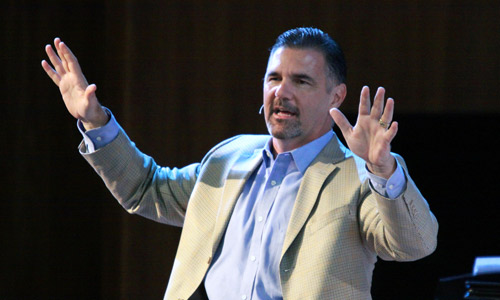Compton Addresses Rival Concepts of God
October 11, 2010
All humanity is divided into two groups: Those who don't believe there is a God (atheists), and those who believe there is a God. Christians are included in the consideration of these rival concepts of the Creator, said Odus Compton, director of student ministries at OBU.
"The reality is, we all have different concepts of God," Compton said during a chapel service Oct. 6. "And I propose to you that our understanding or our view of God affects how we encounter God and, for that matter, how we allow God to encounter us."

Odus Compton, director of student ministries at OBU, addresses the rival concepts of God from C.S. Lewis' book, "Mere Christianity," during a chapel service Oct. 6.
Compton based his message on the chapter, "The Rival Concepts of God" from C.S. Lewis's book, "Mere Christianity." The book is the foundation of the year's chapel theme, "A Return to the Simplicity of the Gospel."
He asked each student to consider what moment in his or her life was the very best -- a time when they felt at the top of their potential -- and write the moment on a piece of paper. Then Compton asked students to flip their papers over and write down their very worst moment or time of life - a day they would erase, if possible, from history.
"Our concept of God -- our understanding of God -- affects how we deal with both of those moments and every one in between," Compton said.
Compton said he would address students' worst moments first, asking them to consider how Jesus would respond if approached with that information. Some people might expect Jesus to react to their worst moment with a raised fist, or perhaps with disappointment. Others might expect him to point an accusatory finger, hammering sinners with his authority. Still others expect he would turn away, beyond disgusted.
In a practical way, this is how people view God about personal failure, Compton said. But based on Scripture, this is not how God responds to people. Compton referred to Luke 15 which conveys the parables of the lost sheep, the lost coin and the lost (or prodigal) son. Told to Pharisees, the most devout religious leaders of the day, Jesus told about the Jewish son who took his inheritance, dishonored his father and worked among pigs. Recognizing his dilemma, the son returned home to a warm welcome from his father. Compton said the Pharisees must have been disgusted about the parable because it did not fit into their concept of God.
Compton told the students that just as the son returned to his father in his filthy state, they also can approach God just as they are, even with their very worst moment in tow. God does not expect people to clean up before they approach him, and he will accept anyone.
"We have our own speeches, do we not?" Compton asked. "We blow it, and then we start bargaining with God: 'God, if you'll just get me out of this one,' or, 'God if you'll fix this, I promise, I'll be a missionary.' ... And we just start laying it out, whatever it is. Somehow or another, we think we can bargain with God. But when we come to God he says, 'I don't want your sacrifices. What I want is you. And, more than that, what I want to do is offer you me.'"
Compton said the punch line of the parable is not the wayward son's return home, but the faithful son's disappointed reaction. He tells his father, "Look, I have been slaving many years for you, and I have never disobeyed your orders, yet you never gave me a young goat so I could celebrate with my friends." The father reacts, "You are always with me, and everything I have is yours."
As the students turned their pages over to reveal the best moments of their lives, Compton pointed out people feel like God owes them for being good.
"Too often, that's the one that plagues us more than the bad stuff," he said, noting it is when every area of life seems to be going as well as possible that Christians ask, "When is God going to pay up?" When people are doing something good and believe God owes them, it is just as bad as when a person has his or her worst day, Compton said.
He read Hebrews 11:6, which indicates that God himself is the reward for people who seek him.
"Let it be that we would truly be satisfied in you," he prayed.